Sunday at the Wise Words Festival was a very different experience for me. It was thoughtful, introspective and more suited to internal musings. I attended two events, the first of which was Julian Baggini's Virtues of the Table at Brown's Coffee House.
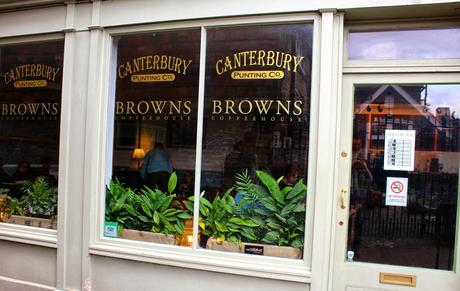 Now coffee house philosophy is hardly an innovative or new idea; there is an entire French movement founded by Marc Sautet called Café Philosophique dedicated to it, and as a movement it is growing all over the world. Before Sautet it was common place in Vienna in the 16th Century, influenced by the expansion of the Ottoman Empire to gather over cups of thick, Turkish coffee and discuss politics with like-minded individuals. Going further back the Agora's of ancient Greece were places for people to come and share ideas with other people, arguing and debating for the pure pleasure of broadening the mind.
Now coffee house philosophy is hardly an innovative or new idea; there is an entire French movement founded by Marc Sautet called Café Philosophique dedicated to it, and as a movement it is growing all over the world. Before Sautet it was common place in Vienna in the 16th Century, influenced by the expansion of the Ottoman Empire to gather over cups of thick, Turkish coffee and discuss politics with like-minded individuals. Going further back the Agora's of ancient Greece were places for people to come and share ideas with other people, arguing and debating for the pure pleasure of broadening the mind. It is not surprising, cafe's are small, intimate and casual environments that act as a natural conduit for the art of conversation and debate, the cornerstones of philosophy. Tolerance, openness and a willingness to listen with both one's ears and mind are the underpinning values and no topic is off limits.
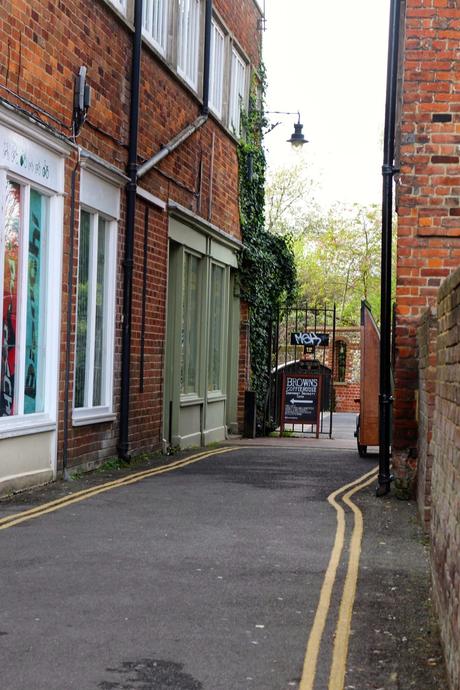
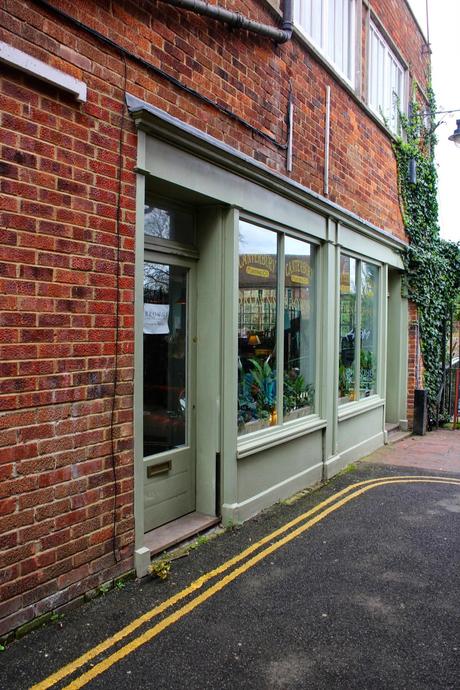 Brown's was the venue for today's foray into the Virtues of The Table, a small, artsy, intimate coffee house off the beaten track on Stour Street right next to the river. As I walked in the place was filled with people working in contented silence, laptops and iPad's open and headphones plugged in, all looking slightly bemused at the rush of newcomers grabbing chairs and coffee and perching on every available counter and corner. There is a real sense here that the freedom to just sit and study, on your own or with friends, is valued.
Brown's was the venue for today's foray into the Virtues of The Table, a small, artsy, intimate coffee house off the beaten track on Stour Street right next to the river. As I walked in the place was filled with people working in contented silence, laptops and iPad's open and headphones plugged in, all looking slightly bemused at the rush of newcomers grabbing chairs and coffee and perching on every available counter and corner. There is a real sense here that the freedom to just sit and study, on your own or with friends, is valued.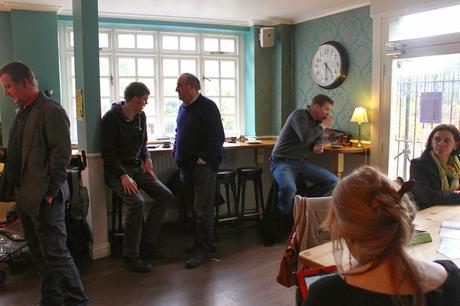
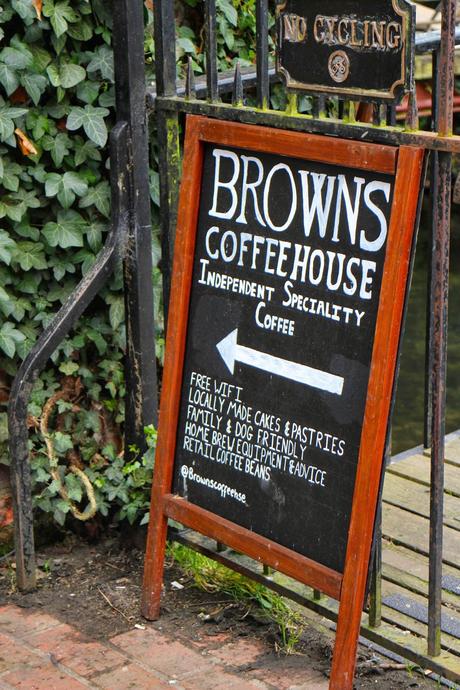
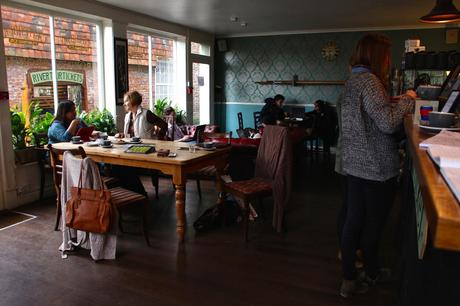 Great red chesterfields speak of long, lazy days lingering over a coffee and a cake whilst the mismatched wooden tables encourage you to sit next to strangers in a very un-British way, covered with pamphlets extolling the various virtues of Canterbury's creative outlets. It is a place that welcomes the artisan. It is an environment that is relaxed and yet somehow lends itself to the pursuit of the intellectual, the broadening of the mind. The communal bookshelves are there for you to help yourself to, and I see travel guides littering the top of bookcases.
Great red chesterfields speak of long, lazy days lingering over a coffee and a cake whilst the mismatched wooden tables encourage you to sit next to strangers in a very un-British way, covered with pamphlets extolling the various virtues of Canterbury's creative outlets. It is a place that welcomes the artisan. It is an environment that is relaxed and yet somehow lends itself to the pursuit of the intellectual, the broadening of the mind. The communal bookshelves are there for you to help yourself to, and I see travel guides littering the top of bookcases. 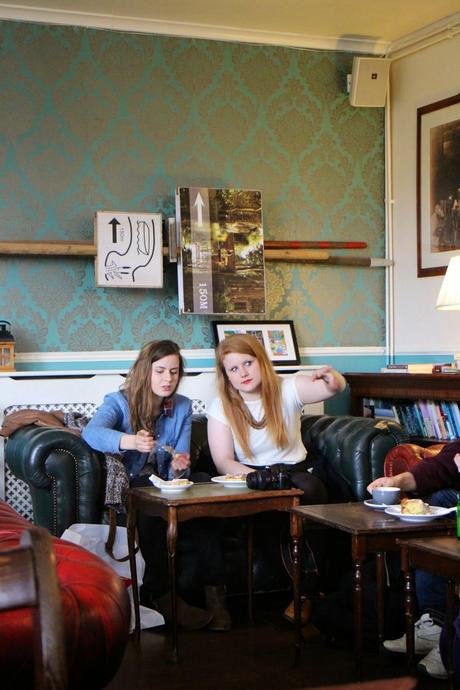
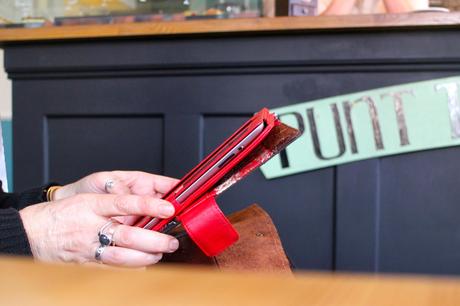 Punting poles hang from the teal green baroque wallpaper and Brown's proudly declares its links to the Riverboat Tours. A long wooden counter with solitary stools lit by the sunlight streaming through the window allow for solitary contemplation reflection overlooking the river. The colours are cool and calming, with window boxes mimicking the reeds that give the Stour its verdant hues of vibrant malachite.
Punting poles hang from the teal green baroque wallpaper and Brown's proudly declares its links to the Riverboat Tours. A long wooden counter with solitary stools lit by the sunlight streaming through the window allow for solitary contemplation reflection overlooking the river. The colours are cool and calming, with window boxes mimicking the reeds that give the Stour its verdant hues of vibrant malachite.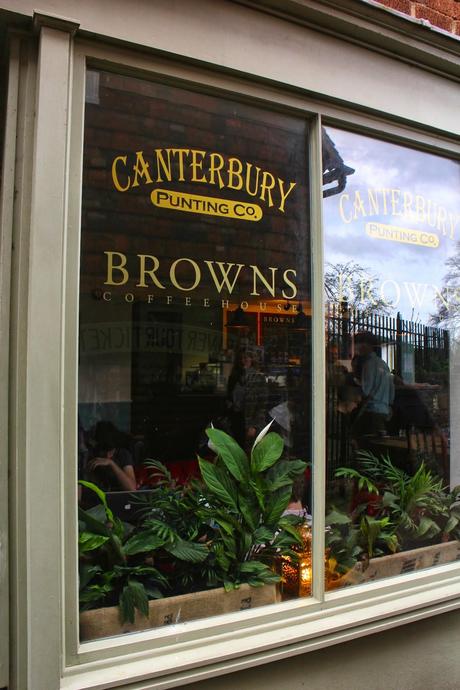 Ratty would be comfortable here. More than comfortable. It has a feel of a sleepy, by-gone era where modern day stresses and speed have no meaning. For the people here, you can believe that, for them as it was for Ratty, the river is their world and they don't know any other.
Ratty would be comfortable here. More than comfortable. It has a feel of a sleepy, by-gone era where modern day stresses and speed have no meaning. For the people here, you can believe that, for them as it was for Ratty, the river is their world and they don't know any other. 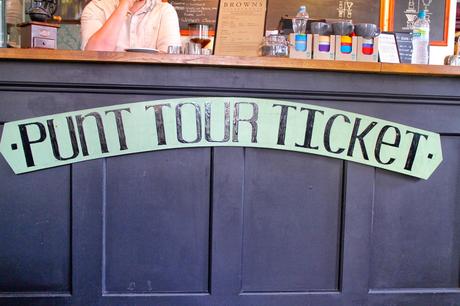 Suitably for a talk on the Virtues of the Table, the food and drink options are delightful and all sourced from local suppliers. Fresh baked cakes and bake-well slices, orange and cinnamon buns, rich kids slice, lemon drizzle cake, apple and almond muffins and raspberry and pistachio moelleux sit in colourful synchronicity in the glass counter cabinets and there is a constant stream of people purchasing them.
Suitably for a talk on the Virtues of the Table, the food and drink options are delightful and all sourced from local suppliers. Fresh baked cakes and bake-well slices, orange and cinnamon buns, rich kids slice, lemon drizzle cake, apple and almond muffins and raspberry and pistachio moelleux sit in colourful synchronicity in the glass counter cabinets and there is a constant stream of people purchasing them. 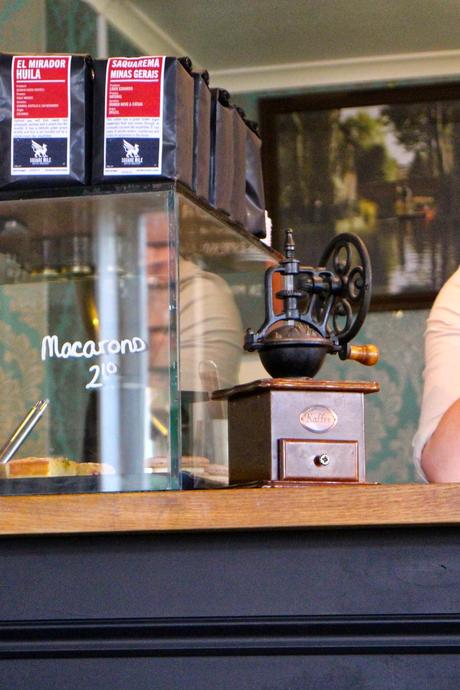 There is also Hunda Oli, and Brown's is the only place in Canterbury that I have seen it so far. Hunda Oli is an Ethiopian coffee, described as sweet and full bodied with apricot notes and also is a new coffee farmer's cooperative, located in the forests of Agaro, Limu in the Oromia region of Western Ethiopia. This is a coffee house that takes its social responsibility and ethical trading code of honor extremely seriously. You can not only buy coffee here to drink in, but purchase bags to take home as well.
There is also Hunda Oli, and Brown's is the only place in Canterbury that I have seen it so far. Hunda Oli is an Ethiopian coffee, described as sweet and full bodied with apricot notes and also is a new coffee farmer's cooperative, located in the forests of Agaro, Limu in the Oromia region of Western Ethiopia. This is a coffee house that takes its social responsibility and ethical trading code of honor extremely seriously. You can not only buy coffee here to drink in, but purchase bags to take home as well.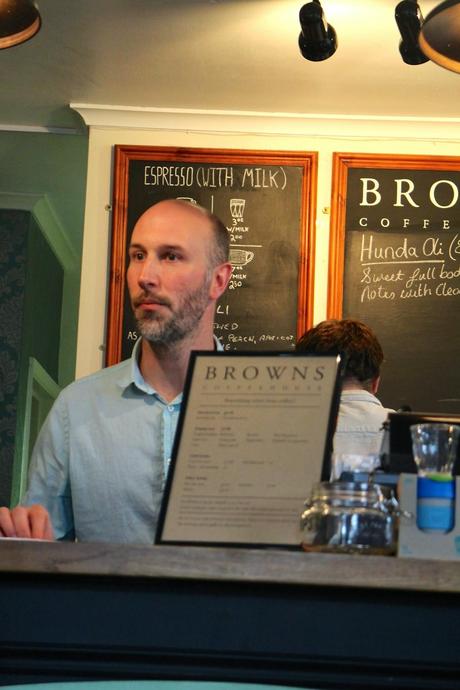
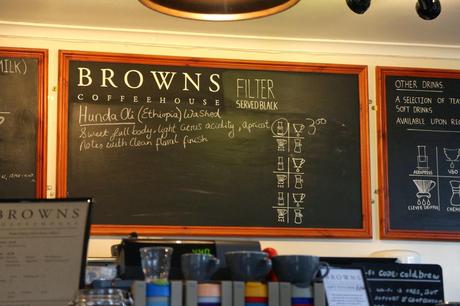 The coffee house is filled to the brim with standing room only when Julian Baggini takes up his position from and center. He starts with the background of food and philosophy and how even the ancients did not credit food with philosophy. Humans have to eat and there was no deeper or thoughtful meaning behind it. Baggini argues that humans have the ability to be reflective as well as physical and intellectual. He discusses the paradigm of taste, that the human experience of eating and drinking relies on us bringing our previous knowledge and experience to the table. He comments on how the environment and the service changes our perception of the dining experience. Does food taste better when we know it has been ethically sourced? Do two identical meals, one costing £15, one costing £50, taste the same to us? Eating as a truly human act is more than just the animal experience of food hitting our taste buds; it also involves our emotions, our beliefs and this is appropriate. Animals feed but humans eat. There is a small child on the same table as me. She is ripping fresh herbs, forming the words I Love You and filling the air with the scent of mint and thyme.
The coffee house is filled to the brim with standing room only when Julian Baggini takes up his position from and center. He starts with the background of food and philosophy and how even the ancients did not credit food with philosophy. Humans have to eat and there was no deeper or thoughtful meaning behind it. Baggini argues that humans have the ability to be reflective as well as physical and intellectual. He discusses the paradigm of taste, that the human experience of eating and drinking relies on us bringing our previous knowledge and experience to the table. He comments on how the environment and the service changes our perception of the dining experience. Does food taste better when we know it has been ethically sourced? Do two identical meals, one costing £15, one costing £50, taste the same to us? Eating as a truly human act is more than just the animal experience of food hitting our taste buds; it also involves our emotions, our beliefs and this is appropriate. Animals feed but humans eat. There is a small child on the same table as me. She is ripping fresh herbs, forming the words I Love You and filling the air with the scent of mint and thyme. 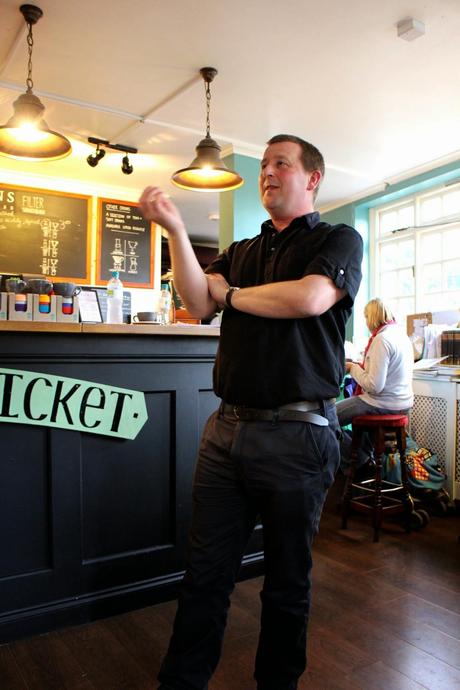 Baggini stands in the center of the room, relaxed and at ease. He is holding court with us and people's faced are rapt and curious. He starts to wind up his discussion after speaking of the ethics of eating as a vegan, especially if you are a lacto-vegetarian and consuming milk, blind to the issues of bull calf slaughter. He is playing devil's advocate now, prodding us for reactions. Is there a judgment here? No, not at all, but that is the nature of philosophy; it is never gentle and rarely subtle.
Baggini stands in the center of the room, relaxed and at ease. He is holding court with us and people's faced are rapt and curious. He starts to wind up his discussion after speaking of the ethics of eating as a vegan, especially if you are a lacto-vegetarian and consuming milk, blind to the issues of bull calf slaughter. He is playing devil's advocate now, prodding us for reactions. Is there a judgment here? No, not at all, but that is the nature of philosophy; it is never gentle and rarely subtle.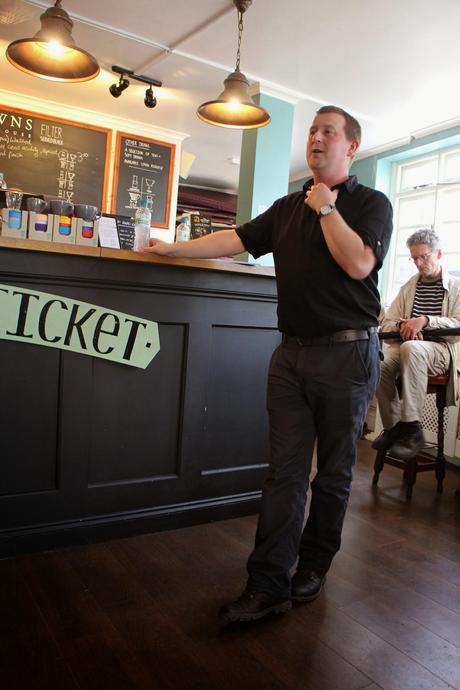
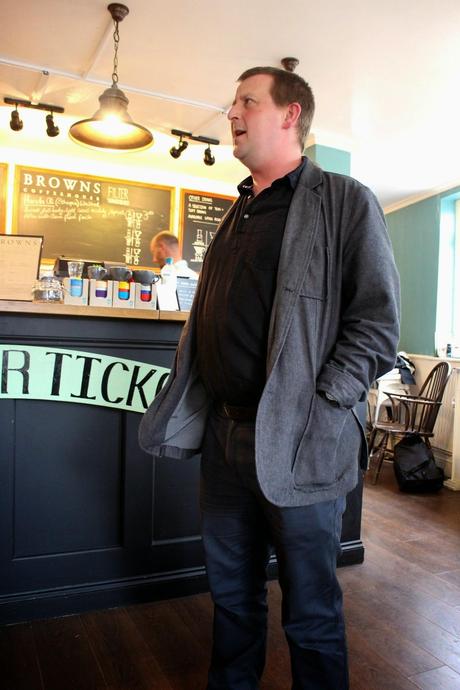
I have always struggled with philosophy. I once took a wild module at University and left half way through my first seminar when they told me a table wasn't a table, it was a chair. I never went back. Whilst I don't get the emotional reaction to philosophy that I get to other forms of creative stimulation such as poetry or theatre, I do find that this is an incredibly interesting mode of discussion and one that forces you to think in ways that may otherwise be alien to you. These discussion though don't need to take place in stuffy lecture theatres or classrooms but can and should instead be conducted in the coffee houses.
After all, humans have been linking food, drink, philosophy and debate since the dawn of civilization.
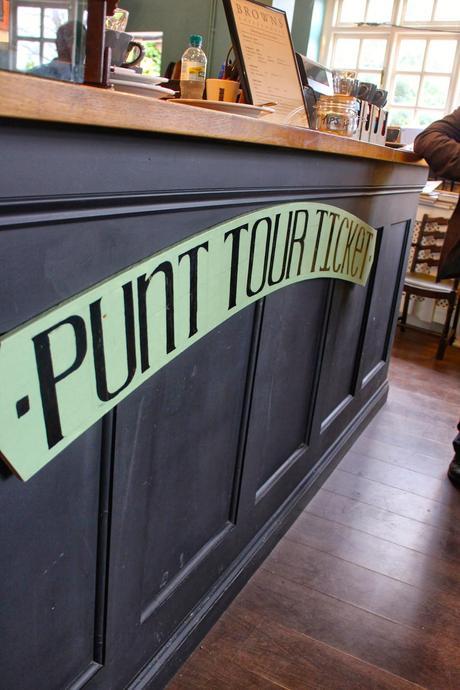 If you like (or hate!) what you have read, please do let me know in the comments below or slap me with a cheeky follow, or say Hi to me on my facebook group or twitter!
If you like (or hate!) what you have read, please do let me know in the comments below or slap me with a cheeky follow, or say Hi to me on my facebook group or twitter!
